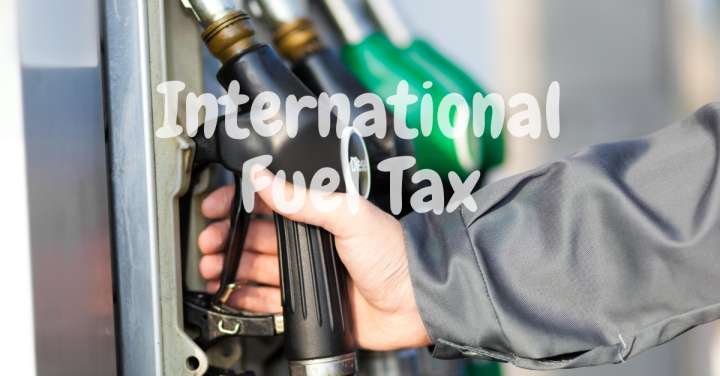A fleet has to abide by several regulations to remain in business and stay on the right side of the law.
Compliance is a major responsibility for anyone involved in the business of fleet management. Also, compliance involves adherence to material rules, hours-of-service regulations, USDOT numbering, licensing, and the International Fuel Tax Agreement.

Though the fleet managers must ensure that the company follows the rules of compliance, the carriers and drivers also need to maintain a level of awareness. At the end of the day, it will help them make better decisions for the benefit of the fleet.
One of the important and pretty confusing regulations that they have to abide by is the IFTA.
Understanding The International Fuel Tax Agreement
IFTA is the cooperative agreement between 10 Canadian provinces and 48 US states. According to IFTA, inter-jurisdictional carriers can inform and pay their taxes for the fuel, which their vehicles use in different states. But they have to use only one fuel tax license.
Before this agreement, truckers had to get fuel permits from all the states they went to. This inefficient process also means additional costs, such as lost time and fuel wastage.
Fleets also need to deal with varying filing definitions, rules, periods, and reporting rules that involve hours’ worth of clerical work.
The agreement has also established efficiency and uniformity in the payments of fuel tax among the member states. Going by the estimates, the International Fuel Tax Agreement has helped trucking companies save millions of dollars each year in administrative costs.
All the states of the USA follow this agreement, except Hawaii, Alaska, and the District of Columbia. In Canada, Saskatchewan, Quebec, Prince Edward Island, Ontario, Nova Scotia, Newfoundland, New Brunswick, Manitoba, British Columbia, and Alberta are the states following the agreement.
International Fuel Tax Agreement – How It Works
Now that we have covered what IFTA is, let’s try to understand how it works. Drivers need to track the amount of fuel they use and the distance they cover in every jurisdiction (regardless of where it is the provinces, territories, or states).
The information is shared by the trucking businesses quarterly to enable the member states to share the taxes accordingly.
It enables the member states to take better care of the roads that are frequently used by the trucking businesses.
Licenses have to get renewed each year. Reports have to be filed for each quarter, even if your fleet never ventured outside the home state during that time.
You also need to understand that the agreement is not for the drivers, but the power units or trucks.
Simplifying Compliance Through The Effective Use Of Telematics
Fleet Telematics is the system of monitoring vehicles using the truck GPS tracker and onboard diagnostics for recording the movements on computerized maps. Fleet managers rely on telematics devices to enhance customer services, improve fleet safety, reduce labor charges, and cut fuel costs.
Top companies like Samsara offer telematics devices for a range of commercial vehicles. Such devices track a wonderful collection of data, right from distances covered to the condition of the roads.
IFTA reporting can be simplified to a great extent through the use of fleet telematics solutions. Telematics help in reporting vehicle and driver information, time and date, location, and the amount of fuel consumed.
You will even get to know about the number of miles driven by the vehicle in each state and the total fuel costs.
So, the driver only has to do his work. The back office employees will get to know the details they need in only a few clicks. Thus, paperwork is reduced, and the reports are made faster and with greater accuracy.
Many trucks already have telematics devices installed in them. Most fleets these days have high-end GPS tracking systems, along with advanced dash cameras. Any violation of rules on the road by your drivers or any roadblocks will be immediately notified to you, along with the rest of the details.
How GPS Tracking Systems Can Help In Compliance
Saving money and time drives businesses towards telematics systems. After all, time is money is any business, and telematics devices can help you save time in the following ways:
- Setting routes faster and easier
- Reducing the idle times
- Automating the mileage logs
- Simplifying IFTA compliance
- Tracking fleet maintenance
You can combine all of these data with the state mileage information. This way will make it much faster once you enable AI on the road for you to compile the required fuel tax data and other important data related to efficiency. It will save a ton of time for your back-office staff and drivers.
Importance Of Maintaining Accuracy In The Reports
It is easy for manual reports to lose accuracy, given all the jurisdictions that trucks have to pass through. If there are inaccuracies due to manual reporting, what kind of penalties would you have to deal with?
Any discrepancy can lead to a major penalty. Some of the common causes of penalty are:
- Filing reports late
- Not filing reports
- Inaccuracy of data
- Failure to record personal miles
- Odometer troubles
Filing wrong returns can make the authorities charge hefty fines of over $1,000.
Late reports also mean a penalty of ten percent of the net tax liability of the quarter or $50, whichever is higher. Organizations face interests for tax delinquency in each jurisdiction at the rate of one percent each month.
This is just a brief overview. There are other penalties and fines, as well.
You wouldn’t want such penalties to add up. Thus, it makes all the more sense to use devices that ensure you pay the fuel taxes on time and accurately.
The Bottom Line
You can opt to buy temporary fuel permits, but remember that it involves more hassles than going for your IFTA license. You can order your licenses online these days. So it’s not like you have to devote all your energy to getting the license ready on time.
So, did you do all that you need to for IFTA compliance? If not, then it is high time to opt for it!
Author Profile
-
Raj Singh is a highly experienced digital marketer, SEO consultant, and content writer with over 8 years of experience in the industry.
As a content writer, Raj has a talent for crafting engaging and informative content that resonates with audiences. He has a keen eye for detail and a deep understanding of SEO best practices.
Latest entries
 ApplicationFebruary 20, 2024Maha Food Hall Ticket 2024 Download Now- with Exam Dates
ApplicationFebruary 20, 2024Maha Food Hall Ticket 2024 Download Now- with Exam Dates ApplicationFebruary 18, 2024tsbie m services hall ticket download Inter 1st, 2nd year [2024]
ApplicationFebruary 18, 2024tsbie m services hall ticket download Inter 1st, 2nd year [2024] AppsFebruary 18, 2024Register on Nivesh Mitra App and Download Certificate/Noc
AppsFebruary 18, 2024Register on Nivesh Mitra App and Download Certificate/Noc AppsFebruary 17, 2024Cozovmoni App Download for Android (2024)-Cozovmoni.com
AppsFebruary 17, 2024Cozovmoni App Download for Android (2024)-Cozovmoni.com





